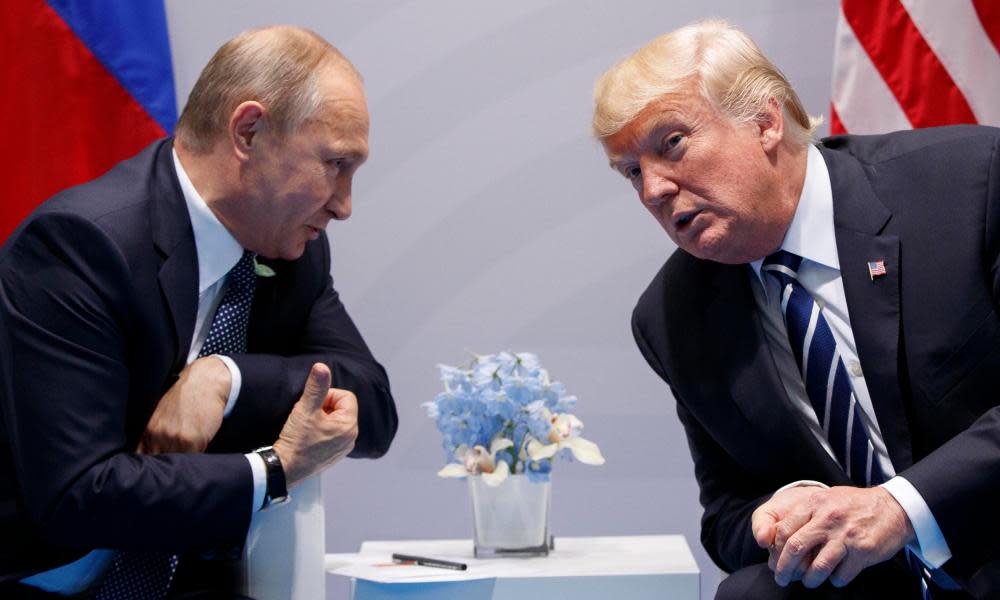Trump & Russia: Sex, Spies and Scandal review – a perilous land of Oz, without the whimsy

Even if you try to avoid the headlines these days, you can’t help but catch snippets of news about how the world is going to hell. Plus there have been other subtle tipoffs, such as the birds fleeing across the skies as the firmament turns orange before our disbelieving eyes. Not for nothing did it turn that vibrant hue. Orange is the colour of Trump, and the barest smattering of knowledge about the man and his presidency has been quite enough to make most of us want to make like the birds and flee.
To have so many of the gaps in that smattering of knowledge filled in – or, if you are better informed, to have it so remorselessly and comprehensively laid out before you all at once – in last night’s Dispatches documentary Trump & Russia: Sex, Spies and Scandal (Channel 4) was almost overwhelming. And – as the title suggests – it concentrated only on, you know, the Russian thing. You could have a whole series on the man: Trump & Sexual Predation: Pussy-Grabbing, Multiple Allegations of Assault and Scandal. Trump & Business: Inheritance, Multiple Bankruptcies and Not Really Knowing What You’re Doing So That You Now Have Less Than If You’d Put That Inheritance in a High Interest Current Account. Trump & Democracy: Not, So, Much.
Presented by Matt Frei, the documentary’s thorough disentanglement of the connections and relationships between Trump, his campaign – and family – members and the former Soviet Union left you feeling as if you had been caught up in a hurricane and deposited at the end in an entirely new country. But we live there now. We live in a land in which the US president has private hour-long chats with the president of Russia whom he praises in public while the American intelligence services look on aghast. In which the leader of the free world and some of the people he appoints to the highest offices have financial links to Moscow’s businessmen that could compromise them at every turn, and those in slightly less high offices are appointed after a vetting process mostly comprising cursory Google searches. And in which the US president may have only come to have that position as a result of his Muscovite comrades hacking US systems and disseminating anti-Clinton propaganda.
The only real question left, as Frei noted, was whether his campaign actively colluded in that hacking. As journalist Franklin Foer puts it – it’s a circumstantial case, but there are a lot of circumstances. Numerous unrecorded meetings between campaign members and senior Russian figures. Millions of dollars washing back and forth. The firing of FBI director James Comey after – according to Comey – he refused to go easy on the hacking investigation. The list goes on and yet, somehow, has not yet amounted to anything anyone can act on in any meaningful way. So, on we go, as Saharan sands and smoke from fires obscure the sun, trying to navigate this perilous land of Oz-without-the-whimsy, no yellow brick road to guide us, hoping that someone pulls the curtain back in time.
The navigation of new mental territory was a factor in another of last night’s documentaries, Army: Behind the New Frontlines (BBC 2). After the conflicts in Iraq and Afghanistan, budget cuts and a decreasing public appetite for military interventions, the powers that be are reluctant to put British boots on the ground again. But then there’s Isis. And a new cold war building in eastern Europe (see the forthcoming documentary, Trump & North Korea: Tiny Hands, Big Missiles and Oh, Too Late). And famine-induced violence in sub-Saharan Africa. New versions of old problems require a new mindset to be applied to old skills. The army now finds itself employed mainly in teaching others how to fight, so that native soldiers can retake their own lands and – hopefully – build the foundations for a more lasting peace in their variously riven countries.
Through the prism of the battle for Mosul, the film drew out the strategic, tactical and psychological aspects of this new role. Soldiers are suddenly dealing not just in orchestrating operations but in Jesuitical niceties. When does protecting themselves against attack become engaging with the enemy? When does support of a local force become compromised by the need to stay sceptical in case they have been infiltrated or their hatred of earlier British presences boils over now? And is sending them off into battle better trained but still less well-prepared than a professional army a job well done or harsh abandonment? Another Oz, and still no yellow brick road to guide us.

 Yahoo News
Yahoo News 
